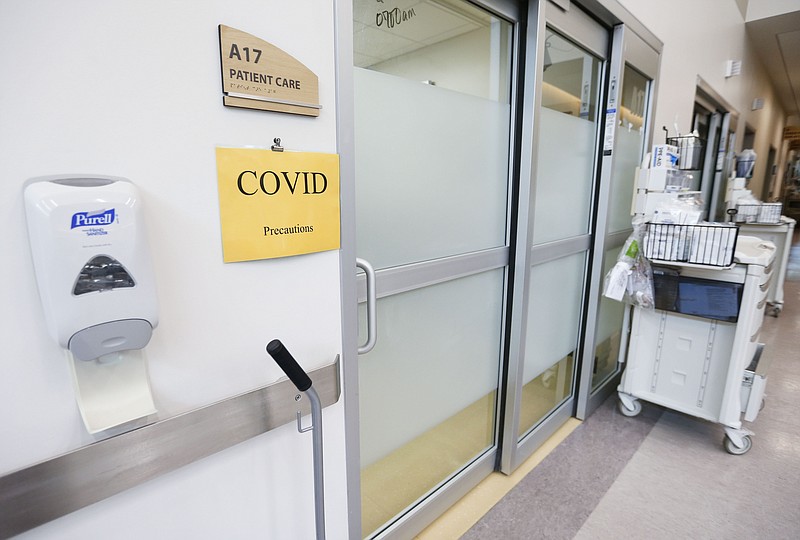Some proposed Missouri bill titles may send a shiver down a spine.
The bill's names -- "No Patient Left Alone Act" or the "No Patient Left Behind Act" -- give rise to thoughts patients are not cared for in their long-term care or hospital settings.
What's happening is as much a reaction to what happened during the COVID-19 pandemic in 2020 and early 2021 as it is to today's health world, said Dave Dillon, Missouri Hospital Association spokesperson.
"There were times early in the pandemic when we were struggling to understand how the disease was transmitted and how infectious it was," Dillon said. "The hospital environment was trying to limit the spread among our organizations by limiting the number of people there."
It was within the best interests of patients and hospitals to protect patients' health while protecting the organizations. Hospitals look a lot different than they did before the pandemic, he continued.
Testimonials from health care workers during the pandemic portray an entirely different picture than the legislation paints, with nurses and hospital staff members staying at patients' bedsides as they die.
But, authors of these bills may believe differently.
The Missouri House of Representatives' Downsizing State Government Committee will hear four bills dealing with hospitals and nursing facilities' visitation policies when it meets 11 a.m. Wednesday in House Hearing Room 5.
House Bill 2116, sponsored by Rusty Black, R-Chillicothe, would create the "No Patient Left Alone Act." The bill would require the health care facility to allow at least one person to be with the patient at all times during the patient's stay in the hospital. It would also not allow a hospital to require patients to have been vaccinated against COVID-19 as a prerequisite to receive treatment or to have visitors.
The bill would furthermore allow patients to designate three "support persons" and require hospitals to allow a guardian and at least one support person to accompany them at all times during a hospital stay.
There are countless ways hospitals have improved the patient/family/caregiver experiences -- while also protecting staff -- since the beginning of the pandemic, Dillon said.
"We understand the extreme difficulty families went through, especially for those at the end of life. They weren't there with their families," Dillon said. "We understand how difficult that was. We want to mitigate that in the future. We have significantly modified visitor policies."
The bills come as hospitals are again tightening their visitation policies because of the increasing spread of the omicron variant of COVID-19. Beginning Saturday, Capital Region Medical Center announced it was limiting services because of the surge. It, like St. Mary's Hospital a few days before, began postponing some procedures that weren't immediately life-saving.
Both hospitals have recently cut back on visitors to prevent overcrowding and spread of the disease.
During the past week, Missouri has had new infections breaking out at an alarming rate. About one in every 100 people in the state is testing positive for the virus, according to Missouri Health and Senior Services data. COVID-19 hospitalizations climbed above 3,600 last week.
House Bill 2097, the "No Patient Left Behind Act," sponsored by Brian Seitz, R-Branson, would require hospitals to allow patients to have visitors at any time -- even during emergencies. The bill also prohibits long-term care facilities from adopting policies during a health emergency that prevent family members, caregivers or public administrators from visiting residents.
House Bill 1690, sponsored by Mitch Boggs, R-LaRussell, would "prohibit hospitals and certain health care facilities from instituting policies that limit patients' abilities to be visited by designated family members or friends during any hospitalization or treatment that lasts for a period exceeding 24 hours, including during a public health emergency as outlined in the bill," according to the bill summary.
House Bill 2221, sponsored by Rep. Ed Lewis, R-Moberly, requires health care facilities allow "essential caregivers," as designated by patient family members, to conduct in-person visits with patients, and prevents long-term care facilities from adopting policies in response to an outbreak of a contagious illness that restrict visits from caregivers, immediate family members and public administrators.
"No hospital shall terminate or suspend the right of any patient who is confined in the hospital to receive visitors at any time, including during an emergency," the bill states.
Health care organizations realize there is value in having an advocate or familiar face in the room, Dillon said. And, the organizations are sometimes caught between what they'd like to do and what the patients advocate for.
"It needs to be a policy that is flexible enough to provide the maximum amount and care and comfort for the patient," he said.
At the same time, health care providers need to protect against a highly transmissible disease.
"Lawmakers are responding to frustration by the public. It is completely understandable," Dillon said. "We're required to protect the public, even if that doesn't make them happy. When there were a lot of unknowns, we erred on the side of making sure the disease wasn't transmitted."
Regardless of how lawmakers come down on the bills, hospitals will do what the law tells them to do, Dillon said.
But, he warned, "Oftentimes, codifying something is more harmful than doing nothing and allowing well-intentioned people close to the action to make prudent decisions. Flexibility got us through the pandemic to where we are now. Flexibility will be necessary to get us through (in the future)."
Click on the link below to read the full bill online:
HB 2116: No Patient Left Alone Act
Sponsor: Rep. Rusty Black
HB 2097: No Patient Left Behind Act
Sponsor: Rep. Brian Seitz
HB 1690: Visitation rights
Sponsor: Rep. Mitch Boggs
HB 2221: Essential Caregiver Program Act
Sponsor: Rep. Ed Lewis

